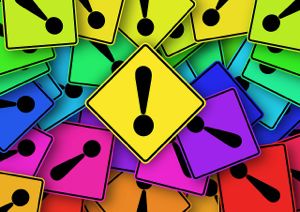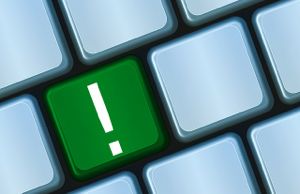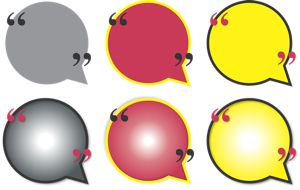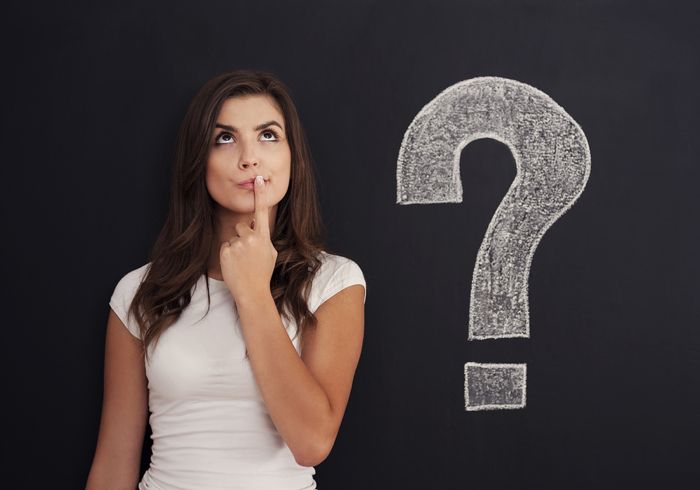Could your punctuation reveal something about you?
You’ve heard of handwriting experts—those people who can read something you’ve written by hand and tell you what your personality is like.
A certain slant to the letters, size of the consonants, or openness between words can reveal characteristics you’d never expect could be revealed simply by your handwriting.
Now, in a recent study, one neuroscientist found he could determine who authored a novel by the pattern of their punctuation.
Seriously?
What Does Punctuation Reveal About Novelists?
Adam J. Calhoun says that after seeing this collection of posters, he was inspired to discover what his favorite novels would look like without words.
“Can you tell them apart or are they all a-mush?” he asks in his blog post on the subject. Turns out that when you remove the words and leave the punctuation as a pattern, the resulting images are quite different.
Calhoun pairs Blood Meridian by Cormac McCarthy and Absalom, Absalom! by William Faulkner, and you can see a distinct difference between the two. (See Calhoun’s blog to compare the images.)
Calhoun also breaks it down, charting how much the authors use things like commas, apostrophes, quotations, periods, and question marks. Faulkner uses a lot more punctuation, on the whole, than McCarthy, except the period, where the frequency is reversed—a side effect of the short, more numerous sentences. Faulkner, on the other hand, is fond of the comma, and allows his prose to build upon itself within one sentence.
Calhoun used his algorithm to examine a number of other titles, and found new evidence of how Hemingway broke from tradition by using fewer commas than most other authors of his time, and how the semicolon has nearly disappeared from novels over the last several decades.
Finally, Calhoun takes his patterns a step further by adding color. “Periods and question marks and exclamation marks are red. Commas and quotation marks are green. Semicolons and colons are blue.” The results are fascinating! (Images also available on his blog.)
Amazing as this research is, it’s not the first time someone has tried to peg an author or his personality by his punctuation.
 What Punctuation Reveals About a Writer’s (or Texter’s) Personality
What Punctuation Reveals About a Writer’s (or Texter’s) Personality
Turns out that the “punctuation personality” idea is quite prevalent!
Author Leah Petersen, in a “just-for-fun” post, asserts that every writer uses and abuses at least one punctuation mark—which one can tell you something about that writer. Those who overuse the period are type A types, she imagines, decisive and clear, while those who overuse the comma are peacemakers who like to get along.
If yours is the exclamation point, you may be anxious and excitable. Question mark abusers may be indecisive and uncertain.
All conjecture. But maybe with a bit of truth?
Writer Alexandra Petri created a similar tongue-in-cheek post about writers and their favorite punctuation marks. If you like the Oxford comma, “You are a person who insists on telling other people how good your grammar is and how much you care about it.” Quotation marks? “As long as you don’t make these with your fingers when you talk, these mark you as a solid individual.”
 In Social Media It’s a Whole Different Thing
In Social Media It’s a Whole Different Thing
Punctuation in texts and social media posts can also reveal more than you may think.
Jessica Bennett, writing in the New York Times, notes that today, “it’s as if our punctuation is on steroids…..tiny marks in the smallest of spaces that suddenly tell us more about the person on the other end than the words themselves (or, at least, we think they do).”
The period, she says, can now feel aggressive, whereas the lack of an exclamation point among women can be enough to suspect that something is wrong.
She quotes Ben Zimmer, a linguist and the executive editor of Vocabulary.com, in saying:
“Digital punctuation can carry more weight than traditional writing because it ends up conveying tone, rhythm and attitude rather than grammatical structure. It can make even a lowly period become freighted with special significance.”
Sam Greenspan, author of the 11 Points Guide to Hooking Up, says that the way you use punctuation—thinking social media here, not novels—can change your dating life.
“Texting removes the vocal cues we once used to overanalyze if someone liked us,” he writes. “Now we have to look at 140 to 160 characters—and with less raw data to work with, our overanalyzing hits a whole different level of insanity. One key aspect of that insanity is reading way too much into every nuance of every text message, especially punctuation.”
A period now adds a new level of finality to the communication, he says, often ending it. Using too many exclamation points can mark you as an “amateur,” and the semicolon just means you’re trying too hard.
Scientists even did a study on this, and reported that so-called “digital messages” that end with a period are considered “less sincere.” They suggest (gasp!) skipping punctuation altogether, as it indicates you are more spontaneous and caring.
The researchers wrote that “punctuation is one of the cues used by senders, and understood by receivers, to convey pragmatic and social information.” Because people are missing the usual social cues that humans use to communicate (facial expressions, tone of voice), they are relying on other cues, like punctuation, to sort out the nuances of a message.
This study was done on college students, however, so it’s likely the results would be different in other age groups. The bottom line seems to be to take care, and realize your punctuation could be saying more than your words.
 What if You Overuse Quotation Marks?
What if You Overuse Quotation Marks?
But back to actual writers and their punctuation. In an interesting post for The Wire by Jen Doll, a few writers share their favorites. R. L. Stine, for instance, chooses the em dash, stating that there’s no better punctuation in a moment of true horror.
Ben Greenman, author of The Slippage, says he likes the period, and that other types of punctuation can “feel like crutches. They tend to crop up when you aren’t thinking clearly.”
Author and NPR book critic Maureen Corrigan chose the semicolon, while film critic and author Kurt Loder prefers the ellipses, stating:
“The ellipsis acknowledges that everything about any subject can never be said—that there is always the possibility of deeper contemplation, the promise of further nattering; that we are a-swim in the murky universe of modern communication.”
Author and literary agent Noah Lukeman, in his book, The Art of Punctuation, talks about what quotation marks may say about you, as a writer:
“In many cases a publishing professional need only flip through a manuscript to get an immediate idea of its worth: quotation marks tell the story. Writers who overuse dialogue (and thus quotation marks) don’t have an acute sense of pacing, don’t realize that a work can progress too fast.”
He adds that writers who overuse the marks to offset individual words or phrases “are more likely to be insecure.” And writers who underuse these marks? They may be serious literary writers, but may also be self-indulgent, and more interested in pleasing themselves than the reader.
“Their work will be slow going,” Lukeman writes, “often deadly so, since they don’t grasp that most writers need to move at a quick pace.”
They may also rely too heavily on description, and have trouble with their characters.
Do You Have a Favorite Punctuation Mark?
What’s your favorite punctuation mark? Do you use it too much? I’ve never thought much about it, but after researching this article I think I’ll be paying more attention.
If you’re equally unsure, here’s a fun punctuation personality quiz you can try. I don’t know how accurate it is. (My scores were pretty close on all.) Maybe it would be better to run your novel through Calhoun’s algorithm just to see what you find?
What’s your favorite punctuation mark?
Sources
Marc Abrahams, “How to Distinguish Novelists by Their Punctuation: How Improbable!” MedPageToday, March 26, 2016, http://www.medpagetoday.com/PrimaryCare/GeneralPrimaryCare/56944?xid=nl_mpt_DHE_2016-03-28&eun=g456254d0r.
Mason Porter, “Algorithmic Distinguishing of Novelists from their Punctuation Patterns,” Improbable Research, March 19, 2016, http://www.improbable.com/2016/03/19/algorithmic-distinguishing-of-novelists-from-their-punctuation-patterns/.
Adam J. Calhoun, “Punctuation in Novels,” February 15, 2016, https://medium.com/@neuroecology/punctuation-in-novels-8f316d542ec4#.yvjicsokf.
Leah Petersen, “Your Punctuation Personality Type,” BryanThomasSchmidt.net, June 11, 2012, http://bryanthomasschmidt.net/guest-post-your-punctuation-personality-type-by-leah-petersen/.
Alexandra Petri, “What your favorite punctuation mark says about you,” The Washington Post, November 29, 2013, https://www.washingtonpost.com/blogs/compost/wp/2013/11/29/what-your-favorite-punctuation-mark-says-about-you/.
Jessica Bennett, “When Your Punctuation Says it All (!),” The New York Times, February 27, 2015, http://www.nytimes.com/2015/03/01/style/when-your-punctuation-says-it-all.html?_r=0.
Stacy Liberatore, “Want your texts to appear sincere? DON’T use punctuation: Researchers say full stops make messages appear less trustworthy,” Daily Mail, December 8, 2015, http://www.dailymail.co.uk/sciencetech/article-3351442/Want-texts-appear-DON-T-use-punctuation-Researchers-say-stops-make-messages-appear-trustworthy.html.
Jen Doll, “Writers’ Favorite Punctuation Marks,” The Wire, September 24, 2012, http://www.thewire.com/entertainment/2012/09/writers-favorite-punctuation-marks/57152/.


Fascinating post, Colleen! I especially love Noah Lukeman’s notes on pacing.
Thanks, Susan! Yes, looks like we reveal way more with our punctuation than we thought!
Oh my! I had an equal score between exclamation point, comma, and colon. My favorite punctuation marks are a tie between an em dash and an ellipses. Sometimes I want to speed up, and other times slow down. Fun post! (I also like parentheses.)
Ha ha. Fun, Angela. You are obviously a punctuation fan all the way around! :O)
In getting the book edited, I discovered a habit of using a lot of dashes. Have been converting those to other punctuation.
The quiz said colon – something that’s replacing some of the dashes. And who knew there was 5 types??
I like dashes too. And I’m always trying to find the right key on various computers to do the right dash! :O)
Semi-colon, all the way; can’t get enough of them. (-;
Wow, two semi-colons so far!
Fascinating! Evidently, I lean toward having a semi-colon personality. Unexpected, but acceptable. 🙂